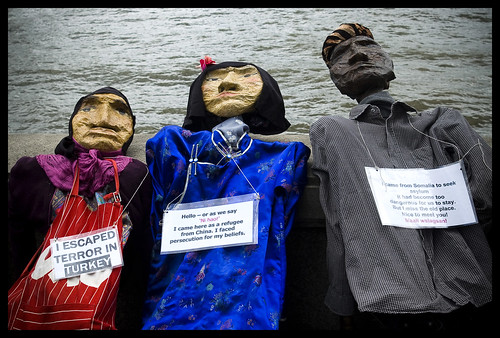
A derelict working men's pub in the heart of central Manchester could soon be transformed into a support centre for destitute asylum seekers in the region. Volunteers from The Boaz Trust and other supportive organisations will renovate the ageing pub into a shelter for individuals who have been made destitute by our UK asylum system.
The most common cause of destitution for asylum seekers is in the post-refusal limbo created by our immigration laws. Once all avenues of appeal and re-appeal have been exhausted, any previous asylum support - meaning housing, government vouchers, any benefits - is withdrawn within 21 days. The government expects asylum seekers, after months of excruciating legal procedures and recalling trauma, to be able to leave the UK within 3 weeks of receiving their refusal.
Some individuals who fit a difficult criteria qualify for 'Section 4', a post-refusal government support system that is given to those who cannot return to their country of origin due to personal safety or other reasons, but agree to return when it is possible. It is worth noting the slight contradiction in terms that a 'refused' asylum seeker is granted support rather than status when their situation is considered too dangerous to return. According to a study by the Joseph Rowntree Trust, many refused asylum seekers are too scared to apply for Section 4, fearing that further correspondence with the authorities will result in their deportation, not their support. Section 4 only provides quasi-derilict housing and £35 in government vouchers per week, a small fraction of what the government considers adequate income support for 'native citizens.'
A recent report by the Red Cross revealed that 59% of questioned asylum seekers had been destitute for at least 1 year. Unable to work - either when awaiting status or whilst destitute - asylum seekers are forced either onto state support (which is incredibly limited) or into poverty and destitution. In 2009, the London School of Economics estimated that there were 500,000 refused asylum seekers in the UK. With the onslaught of government cuts, these precarious lives are reliant on the support of various charitable organisations, compassionate friends and relatives or on handouts from faith groups. Britain acts as a place of survival, not sanctuary.
Considering the horrific situations many asylum seekers are escaping from, it is not surprising that many are unwilling to immediately leave the UK. It is important to remember that many of the negative initial decisions of the UKBA are overturned on appeal; a quarter of refused asylum seekers were unjustly asked to leave the UK in the last quarter of 2011.
When the coalition is unlikely to make the necessary drastic changes to our asylum and immigration policy, initiatives such as the destitution support centre in Manchester are all the more important. This is not government-sponsered Big Society, but government-enforced Big Society; independent charitable organisations are forced to fill the gaps created by dwindling state support. We should not thank the generous government, but this is not a reason to turn our backs on crucial social issues. We must use this opportunity to create autonomous centres that promote dynamic social change. We do not have to follow Cameron's "big society" narrative; it is time for communities to take back authorial power.
Image (c)AmnestyUK